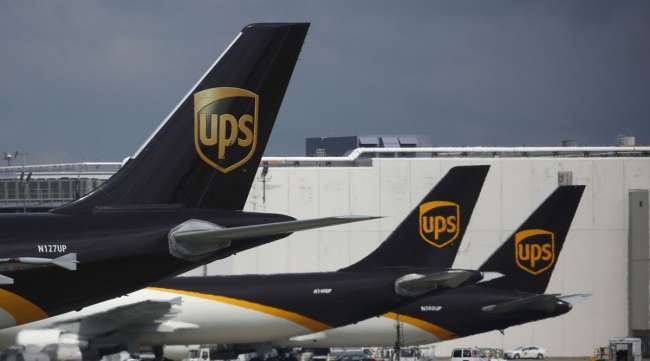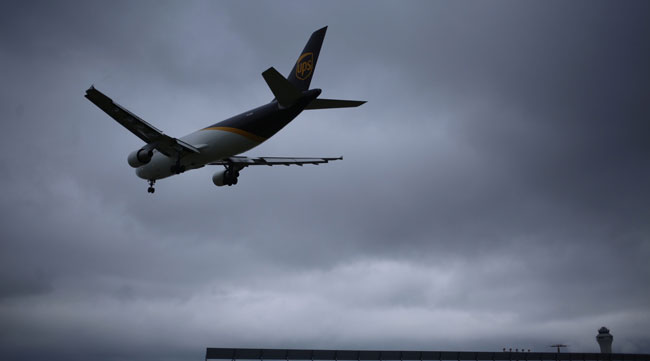Bloomberg News
UPS Readies Freezer Farms to Store Virus Vaccine When Approved

[Ensure you have all the info you need in these unprecedented times. Subscribe now.]
UPS Inc. is building two giant freezer farms capable of super-cooling millions of vials of a COVID-19 vaccine, preparing for the day when it will need to deliver the medicine at high speed across the globe.
The facilities, under construction near UPS air hubs in Louisville, Ky., and the Netherlands, will house a total of 600 deep-freezers that each can hold 48,000 vials of vaccine at temperatures as low as minus 80 Celsius ( minus 112 Fahrenheit). That’s on par with some of the coldest temperatures in Antarctica.
Distributing a COVID-19 vaccine — if one is approved for use — will be the second huge logistical challenge spawned by the pandemic for delivery giants UPS and FedEx Corp., which earlier this year mobilized to airlift thousands of tons of protective gear for health care workers across the world. This time, the job is moving fragile vials of medicine under exacting conditions for the world’s best shot to stamp out the coronavirus and restore economies.
“This truly will be a historic supply chain feat to distribute millions, if not billions, of life-saving COVID-19 vaccine vials to far-reaching global populations,” said Wes Wheeler, president of UPS Healthcare. “Lives will depend on us to get these vaccine deployments right, and we’re well-prepared to support all of these efforts until this pandemic is behind us.”
Researchers are working feverishly to create effective vaccines and treatments, with multiple projects at various stages of development. If they’re successful, the next challenge would be for the world’s transportation network to get the medicine into the hands of doctors and patients on a global scale.
FedEx and DHL Global Forwarding also have been expanding their temperature-controlled transport capabilities. DHL opened a $1.6 million facility in Indianapolis this month. FedEx is adding freezers, refrigerated trucks, sensors and even thermal blankets, Bonny Harrison, director of global media relations, said in a statement.
“Since the onset of the COVID-19, we’ve been working with governments, medical systems and our customers to help communities around the world access critical supplies and keep supply chains moving in the face of this crisis,” Harrison said.
Time and temperature sensitivity will vary for different vaccines. Several candidates have had success in early trial phases, and some are more fragile than others. UPS freezer farms will be designed to handle the most stringent specifications, Wheeler said.
The Atlanta-based courier has been in discussions with the U.S. Department of Health and Human Services and the federal Operation Warp Speed team to discuss what will be needed to distribute a vaccine. Operation Warp Speed was organized to expedite vaccine development by pulling together pharmaceutical companies such as Johnson & Johnson, Pfizer Inc. and Moderna Inc. in a coordinated effort.
Freezer farms are a standard solution in the pharmaceutical world, which often has storage needs for delicate medical supplies such as blood samples, biological tissue or vaccines for a variety of diseases. UPS and FedEx already had some freezer capacity, but UPS realized it needed something on a much larger scale to handle a sudden swell in demand for a COVID-19 vaccine.

A cargo jet descends for landing at the UPS Worldport facility in Louisville, Ky., on July 31. (Luke Sharrett/Bloomberg News)
Freezer Danger
Walk-in vault freezers for mass storage weren’t a practical option, Wheeler said.
“[At minus 80 Celsius], you could probably survive for 5 seconds, even with a ski suit on. You’re better off building a farm with stand-up freezers that are mobile.”
UPS’ freezers will be certified by the U.S. Food and Drug Administration to hold the super-chilled cargo. Ten to 15 employees will be needed to manage each farm, which can store as many as 14.4 million glass vials with a 2 milliliter capacity, or about half a teaspoon. With the facilities’ proximity to UPS air cargo hubs, the company will be able to provide overnight delivery to almost anywhere in the world, Wheeler said.
For transport and delivery, the vaccines will be handled like many other fragile medical supplies already shipped by UPS, packed into containers of frozen carbon dioxide — dry ice — that keep it cold while being moved between trucks and planes.
$15,000 Units
UPS declined to say how much it’s investing in its new facilities, which can be used for other medical products as it continues expanding its health care business beyond the COVID-19 crisis.
Ultra-low-temperature freezers typically can cost from $10,000 to $15,000, according to Tim Root, marketing chief for manufacturer Stirling Ultracold. That would amount to a minimum cost of $6 million for just the freezers on both farms.
Freezers are being installed at the farms now, Wheeler said, and should be ready by the time a vaccine is approved. UPS also is buying freezers to put in South America, Frankfurt and the U.K., though not in farms.
“Moving parcels with dry ice and critical drug product is not a new thing for UPS. Transportation is our bread and butter,” Wheeler said. “Storing at minus 80, blast freezing at minus 80, making sure that time and transit is reduced to a minimal amount, all that is pretty new to us.”
UPS ranks No. 1 on the Transport Topics Top 100 list of the largest for-hire carriers in North America and No. 2 on the TT Top 50 list of the largest logistics companies in North America.
Want more news? Listen to today's daily briefing:
Subscribe: Apple Podcasts | Spotify | Amazon Alexa | Google Assistant | More




